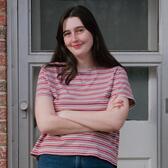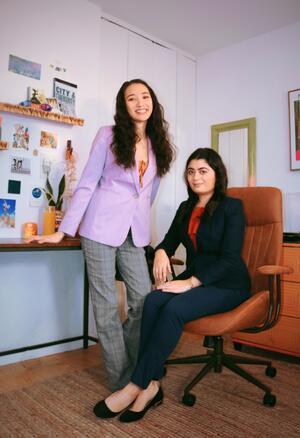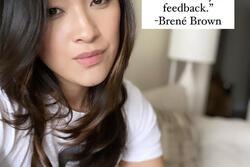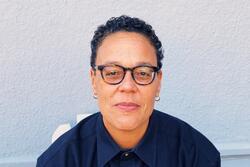7 Questions For Jenni Rudolph and Maryam Chishti
JWA talks to Jenni Rudolph and Maryam Chishti, Co-Executive Directors of The LUNAR Collective, the only organization by and for Asian American Jews.
JWA: First, I’d love to hear each of you speak to what inspired you to play a foundational role in the LUNAR Collective, and what you’ve gained from being a member of this organization.
Jenni: I co-founded The LUNAR Collective’s origin project, LUNAR: The Jewish-Asian Film Project, an unscripted docuseries featuring 23 Asian Jewish young adults. Like many Asian Jews in our community, I grew up believing I was the only Asian Jew. Through the film series, I was inspired to create authentic Asian American Jewish representation and stake our claim in the mainstream Jewish narrative.
Now as Co-Executive Director alongside Maryam, I’m honored to be serving such a vibrant and warm community of Asian American Jews. I’m thankful for all of the people I’ve connected with through LUNAR. It feels so fulfilling to be making an impact and cultivating connection, belonging, and visibility for my community.
Maryam: I joined The LUNAR Collective in the summer of 2021 when it was still a film project. When I came on as their community organizer, LUNAR was starting to daydream about what in-person community events could look like, and I tried to fill that need. Similar to Jenni, I also felt like I was the only one with a “weird, hard to place” identity, and it's been layers and layers of processing and reflection on who I am, how I carry myself, and how the world sees me since joining LUNAR. This is really fulfilling work, and I'm so glad to be a part of it.
JWA: The LUNAR Collective recently published the 2023 edition of your Passover Haggadah, titled Dancing In Between. What was it like to put that Haggadah into practice at your collective seder this April?
Maryam: Having our own LUNAR Haggadah this year was truly amazing. It's a Passover text that was created by seventeen Asian Jews. Seventeen! It includes new artwork, blessings, queer reflections on the Maggid, and even our first ever LUNAR nigun. Throughout the process of creating our Haggadah, and even now, it's so exciting to think about what Asian Jewish ritual, text, and community can look like—when it's never been created before. I'm incredibly proud of our Haggadah, and believe it's an amazing blueprint for why we should invest and support JOC affinity spaces, so that these communities can work together to engage with their Judaism in a way that encompasses all that they are.
JWA: The LUNAR Collective was originally founded as a film project, featuring interviews and conversations between Asian American Jews. What most surprised you about the testimonials you heard?
Jenni: I was struck by how diverse our experiences are, even within this seemingly niche intersection. We connected with Asian Jews from all across the Jewish spectrum, including secular Jews like myself, Reform Jews, Conservative Jews, even Modern Orthodox Jews. Mixed race Asian Jews, interfaith Asian Jews, Asian Jewish adoptees, Asian Jews by choice. Asian Jews with heritage from all over the world. Asian Jews who grew up with zero access to their cultures, and Asian Jews who were totally immersed. Asian Jews who immigrated to the United States, and Asian Jews whose families have been here for generations. Asian Jews of all shapes, sizes, and skin tones. Asian Jews with a range of occupations, class backgrounds, family dynamics, and beliefs. There’s truly no one way to be an Asian Jew.
And even with all this diversity, I was also struck by how much common ground we all shared. No matter your differences, there’s always something viscerally affirming about meeting someone who shares such a core part of your identity.
JWA: Can you remember the first time you had an intersectional experience, celebrating both your Asian and Jewish identities? What was that experience like?
Maryam: My first intersectional experience was having a Muslim and Jewish “coming of age ceremony” at age thirteen. I have an Ashkenazi Jewish mother, and an Indian Muslim father who brought me up in both religions and wanted me to come of age in both. That was an extremely profound moment for me as I started to learn about these religions and my family values alongside each other, and really infused these religions and cultures together. It was also really moving at the ceremony to be blessed by a rabbi and an imam and celebrate with both my Jewish and Indian family, who were so supportive and loving.
Jenni: The first time I gathered on Zoom with dozens of Asian Jews in 2020, I felt a strange sense of symmetry. It was the first time I wasn’t visually the “odd one out” in any group. It was refreshing to connect with people who understood my full self, who didn’t question me or raise feelings of impostor syndrome. I realized how accustomed I was to separating my identities and code-switching between them.
JWA: You both have experience as performing artists, Jenni as a musician and Maryam as a theater-maker. How do you connect your work with LUNAR to your artistic practice?
Jenni: My work with LUNAR initially overlapped with another project of mine, “Water & Oil,” which was a song, music video, and documentary exploring mixed-race identity in collaboration with 27 mixed creatives across 9 cities. More recently, I’ve been collaborating with fellow Asian Jewish musicians on songs inspired by Asian Jewish identity, including LUNAR’s new Asian Jewish nigun.
Even beyond the projects directly connected to LUNAR, I’ve been approaching all of my music projects with a greater hunger for illuminating untold stories, embracing duality, and showing up as my full self. In the past, I’ve often felt the need to hide or distance myself from my heritage to fit in. Asian Americans are highly underrepresented, under-supported, and often considered “unmarketable” in the music industry. And even with the legacies of countless iconic Jewish songwriters and composers, stereotypes and prejudices make it risky for me to disclose my Jewishness in some circles. Through LUNAR, I’ve realized that by choosing to be visible, I can contribute to a more inclusive industry, represent my communities, and surround myself with people who value me for everything I am.
Maryam: My biggest love is Theater for Social Change, doing historical/political storytelling. LUNAR has really met that interest, as it feels revolutionary to push our stories to the forefront of what a Jewish story can look like. On top of that, engaging with LUNAR, the art, community, and advocacy events that we do touch on a really vulnerable part of myself. It's making a community that I wish that I’d had growing up, and also a community that I know will continue to grow. Seeing that growth every day keeps us going.
JWA: How can non-POC Jews best support Jews of color in our faith spaces?
Maryam: In terms of supporting LUNAR—share our work with the people in your lives. Engage with our nigun, download our Haggadah, and watch our web series. If you/your work are able to offer venue space, connect us to a speaking engagement —or give a sliding scale donation. Those are all really amazing ways to help. And the largest takeaway is to speak up when you see racism and prejudice happening in your life and in your Jewish community. I saw this video yesterday of a guy interviewing people on the streets of New York on “what makes a Jew.” It was a completely Ashkenazi-focused video. It would have been wonderful and meant a lot if just one person went on the mic and said, “Jews of Color are Jews too.”
JWA: How can people get involved with The LUNAR Collective?
Jenni: Follow our Instagram @asian.jews for updates, and visit our weareasianjews.org to subscribe to our newsletter, browse our media and resources, donate, partner with us, or apply to join our team!







